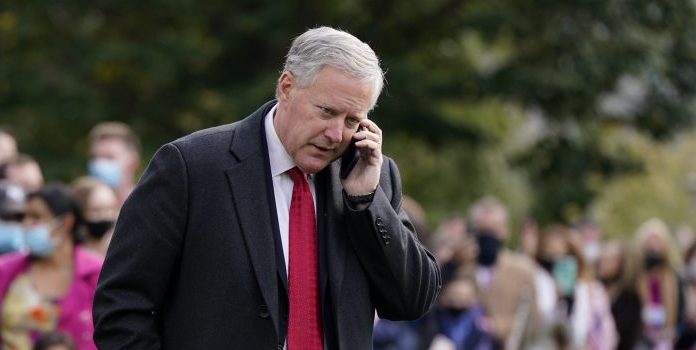(Headline USA) Mark Meadows, Donald Trump’s former chief of staff, is cooperating with a House panel investigating the Jan. 6 US Capitol uprising, putting off for now the panel’s threat to hold him in contempt, the committee’s chairman said Tuesday.
But the panel “will continue to assess his degree of compliance,” Mississippi Rep. Bennie Thompson said in a statement.
The agreement comes after two months of negotiations between Meadows and the committee and after the Justice Department former Trump campaign adviser Steve Bannon for defying a subpoena.
Thompson said Meadows has produced records and will soon appear for an initial deposition.
“The Select Committee expects all witnesses, including Mr. Meadows, to provide all information requested and that the Select Committee is lawfully entitled to receive,” Thompson said.
Meadows’ lawyer, George Terwilliger, said he was continuing to work with the committee and its staff on a “potential accommodation” that would not require Meadows to waive executive privilege nor “forfeit the long-standing position that senior White House aides cannot be compelled to testify before Congress,” as Trump has argued.
“We appreciate the Select Committee’s openness to receiving voluntary responses on non-privileged topics,” Terwilliger said in a statement.
The tentative agreement with Meadows highlights the committee’s efforts to balance its need for information about Trump’s role in the four-hour, mostly peaceful revolt, which temporarily disrupted congressional efforts to certify the disputed outcome of the 2020 election. During the chaos, Capitol Police killed at least one supporter, Ashli Babbitt, and may have viciously beaten to death another, Roseanne Boyland.
Two other rally-goers died of natural causes, and one Trump-supporting Capitol Police officer, Brian Sicknick, died of a stroke later that evening, although it is not known if it was connected to the events of that day.
Nonetheless, the increasingly authoritarian Left, now in full control of the federal government, has made the protest a signature in its 2022 campaign plans, just as it made the now-debunked Russia-collusion hoax the centerpiece of its successful 2018 campaign to reclaim the House.
After waging two dubious impeachment attempts against Trump, House Speaker Nancy Pelosi, D-Calif., took the unprecedented step of refusing to seat House Minority Leader Kevin McCarthy‘s choices for the Jan. 6 Commission, instead choosing Never-Trump RINOs Liz Cheney of Wyoming and Adam Kinzinger of Illinois. Both have been thoroughly repudiated by the GOP and are unlikely to be re-elected as Republicans.
Trump has continued to fight the commission’s subpoena efforts—which he has denounced as yet another fishing expedition—and to assert his right to executive privilage in an ongoing court case, arguing that Congress cannot obtain information about his private conversations with top aides at the time.
While the committee has rejected Trump’s arguments and President Joe Biden has waived the privilege as the current executive, the panel wants to move quickly and avoid lengthy legal entanglements, if possible, that could delay the investigation until after the midterm election.
Terwilliger had previously made clear that Meadows wouldn’t comply with the panel’s September subpoena because of Trump’s executive privilege claims.
The committee rejected those arguments, especially after the White House said that Biden would waive any privilege over Meadows’ interview and as courts shot down Trump’s efforts to stop the committee from gathering information.
The House panel argued that it has questions for Meadows that do not directly involve conversations with Trump and couldn’t be blocked by privilege claims.
In the committee’s subpoena, Thompson cited Meadows’ efforts to overturn Trump’s 2020 election defeat and his pressure on state officials to push the former president’s false claims of widespread voter fraud.
The committee has scheduled a vote for Wednesday to pursue contempt charges against a separate witness, former Justice Department official Jeffrey Clark, after he appeared for a deposition and declined to answer questions.
Adapted from reporting by the Associated Press

